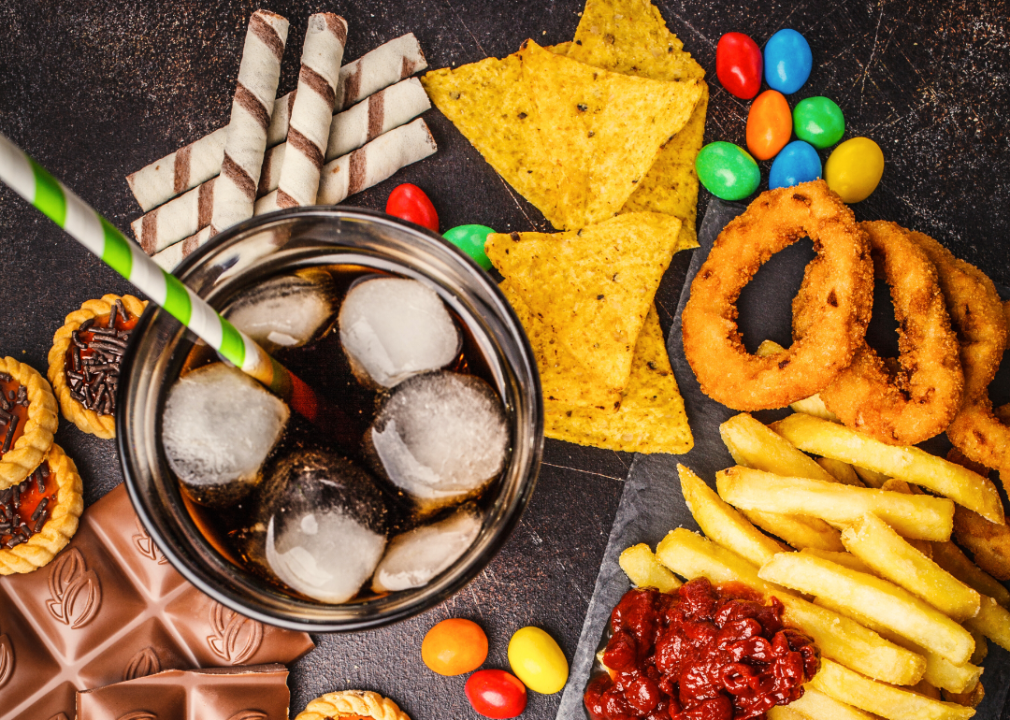The Image Party // Shutterstock The FDA hasn’t waded into the debate over Flamin’ Hot Cheetos, but the popular snack food has become public enemy #1 in school districts around the country. Since the early 2010s, schools in states like California, New Mexico, and Illinois have banned the snack due to their lack of nutritional value and messiness. Parents specifically worry about the effects of artificial dyes used in snacks like Flamin’ Hot Cheetos on child development. There is a proposed ban that would prohibit schools from serving foods containing six food dyes as well as titanium dioxide–and Flamin’ Hot Cheetos contain three of them (red 40, yellow 5, and yellow 6). Konjac jelly candies Canva Konjac jelly candies–sold under names such as “mini-cup jelly products” and “mini fruity gels”–gained international appeal for their chewy texture and assortment of sweet and tart flavors. The treat is made from the konjac plant, which primarily grows in China and Southeast Asia. Their small size and firm consistency led to numerous choking incidents, especially among children. As a result, the FDA banned the import and sale of konjac jelly candies in the U.S. in 2001 to prevent further choking hazards. You may also like: Midcentury modern design in 10 essential pieces Tonka beans Canva Native to South America, tonka beans are known for their rich, vanillalike aroma and are used in perfumery and flavors around the world. But the beans contain coumarin, a compound linked to liver damage in high doses. Consequently, the FDA banned the use of tonka beans in food products in 1954. Despite the ban, they remain legal for nonfood uses, such as perfumes and tobacco. Wild abalone Canva Wild abalone (sea snail) has been a coveted delicacy along the United States Pacific Coast, particularly in California, for centuries. But overfishing and environmental changes led to a dramatic decline in abalone populations. In response, California banned the commercial harvesting of wild abalone in 1997 to protect the species from extinction. It also banned harvesting for sport in 2017 to help the population regrow, but the sport could reopen in 2026. Soda with brominated vegetable oil Canva Brominated vegetable oil has been used as a food additive since the 1920s and commonly serves as an emulsifier in fruit-flavored soft drinks to keep flavoring oils evenly distributed. By the 1970s, concerns about the health effects of BVO–including the potential to lead to nervous system, thyroid, and reproductive issues–prompted regulatory scrutiny. In 1977, the FDA set temporary limits on BVO usage but did not ban it outright. In July 2024, the FDA announced the decision to revoke the regulation authorizing the use of brominated vegetable oil in food, and the ban took effect on Aug. 2. Kangaroo meat Canva The Indigenous people of Australia have long consumed and managed kangaroo meat, which eventually made its way to the United States. In 1970, concerns over animal welfare and the impact on kangaroo populations led then-California Gov. Ronald Reagan to sign legislation banning the sale of kangaroo meat and leather, which went into effect in 1973. Swan Canva Certain swans, including the North America-native trumpeter, are endangered species in some states. While hunting the tundra swan is legal in some areas of the U.S., trumpeter swans are illegal to hunt across much of America. You may also like: 2024’s leading cities for quality of life Sassafras oil Kathy Clark // Shutterstock Nope, there is no authentic sassafras oil in your root beer. The FDA banned sassafras oil because it contains the compound safrole, a potential carcinogen. However, safrole is permitted in substances where it occurs naturally, like cinnamon and star anise. Queen conch Canva Queen conch meat is a favorite dish throughout the Caribbean, but overfishing has made harvesting the mollusk illegal in states like Florida. However, according to the Fish and Wildlife Service, you may be able to find queen conch in some parts of the United States. It can be imported from parts of the Caribbean that aren’t subject to the trade prohibitions. Sea turtle Canva Sea turtles are on the World Wildlife Fund’s endangered species list. Though it’s still legal to hunt them in more than 40 countries and territories, the United States isn’t one of them. Sea turtles were used to make turtle soup in the past, but their endangered status has led to the dish’s falling popularity. Mont d’Or
Food and drink items that are highly restricted or banned in the US















